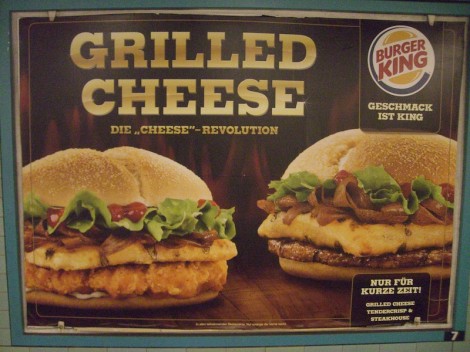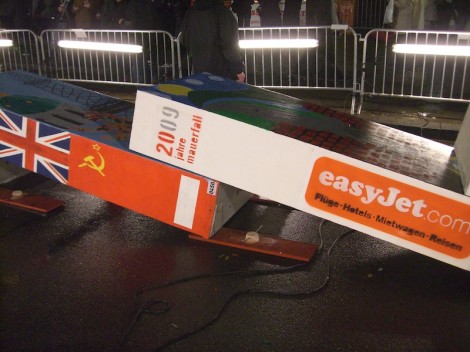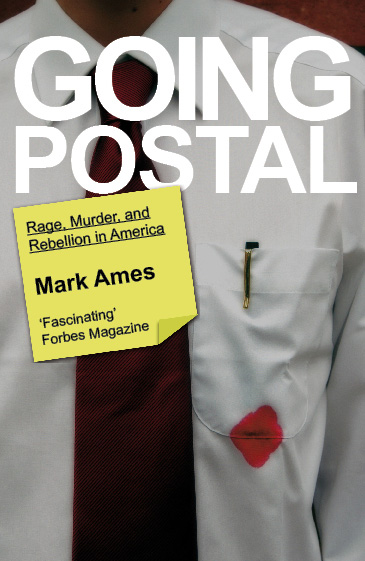
This story first appeared on Alternet.org
It was immediately obvious wandering through Berlin last weekend that the celebrations of the 20th anniversary of the fall of the Berlin Wall were in trouble.
In Alexanderplatz subway station, the main eastern transport hub, wall-sized billboards advertising the Fest der Freiheit — Festival of Freedom — were side by side with huge Burger King ads for a new grilled cheese snack. The tag line: “The Cheese Revolution.”
Sure, it’s easy to celebrate the events of November 9, 1989, in the abstract. After all, what’s not to like about casting off the shackles of a dictatorial system in which people couldn’t freely express their opinion and were shot for trying to leave, in which tens of thousands of citizens spied in each other, and in which you might be denied a place at university or a job if your parents weren’t party members — But when it comes to putting on an actual celebration, as the city of Berlin learned, it gets trickier.
The weekend kicked off with U2 playing a free concert Thursday night at the Brandenburg Gate as part of the MTV European Music Awards. The band distributed 10,000 free tickets for the pen where the show would take place. But in a move that, as it turned out, set the tone for the entire anniversary, U2 played behind an opaque wall, making it impossible for those without tickets to see the free show intended to mark — lest we forgot the full extent of idiocy here — the fall of the wall.
As for Monday night’s Festival of Freedom, huge numbers of Berliners have been for one reason or another sufficiently disgruntled at the chain of events subsequent to the fall of the wall, that they can no longer celebrate the fall as a discrete accomplishment — and as a result cannot celebrate its fall at all. Much of the crowd, then, consisted of foreigners along with Germans not old enough to remember the actual events.
For those who did go out to the festival, doused by icy rain showers, it only got worse. The fall of the wall was such a symbolically important event that the you assume festival organizers would have been hyper-conscious of symbolism in the anniversary events. Not so.
The main events were centered around the Brandenburg Gate, which sits directly on the old fault line between East and West Berlin. All the staged aspects of the night — various musical performances, the main television host, the VIP seating — are on the west side of the Gate and in the case of the performances, they are all facing west, with their asses to the East.
To make matters worse, on the night of the Freedom Fest it was impossible to approach the Gate from the East. Unter den Linden — the main boulevard stretching from Alexanderplatz past museum island, the opera, and Humboldt University — was entirely closed by the time the festival kicked into gear. Instead of just reserving a lane for emergency vehicles, the full width of the boulevard as well as the broad, tree-lined median strip was blockaded by police vehicles and temporary barriers.
The scene was dishearteningly reminiscent of concerts at the Brandenburg Gate during the 1980s. Back then, acts including David Bowie, Genesis and the Eurythmics played open-air shows to West Berlin audiences right at the Gate; Eastern music fans would try to congregate on the GDR side to hear the music wafting over the wall only to be blocked and end up clashing with police.
When Bon Jovi and Paul Van Dyk sang their songs, they had their backs to the East. Berlin-based Van Dyk, popular elsewhere in the world for his pop-cheese take on techno, can’t get arrested in Berlin, where some of the most revered electronic music clubs in the world take their tunes far more seriously. Bon Jovi sang a song — called “We Weren’t Born to Follow” — that in the context sounded unforgivably patronizing. Then the band got a plug for their upcoming tour. The crowd jeered.

Given America’s seemingly grandiose ideas of its role in the fall of the wall, it’s interesting to note that this, together with David Hasselhoff’s apparently drunken cameo at the MTV European Music Awards a few nights before — slurring through a few lines of his 1989 hit “Looking for Freedom” and saying no, he hadn’t brought down the wall, Berliners had (um, thanks for the clarification) — was the lone nod to the US during the anniversary weekend. And mercifully, there is no mention of Ronald Reagan’s made-for-American-TV address featuring the oft-quoted (here in the US) tear down this wall line. So much for that legend.
Using the enthusiasm of the audience’s cheering, it’s clear then-Hungarian head of state Miklos Nemeth is regarded as the single most important figure in the fall of the wall. He opened the border between Hungary and Austria in the summer of 1989. When tens of thousands of East Germans began to flee — illegally, as far as East Germany was concerned — to the West that way, it created incredible pressure on the GDR leadership to open their own borders to stem the tide and keep the place from emptying out altogether.
The next loudest cheers came for Lech Walesa, the Polish labor leader whose efforts with Solidarity forced free elections in Poland.
Third biggest crowd response was reserved for former Soviet ruler Mikhail Gorbachev, whose policies of restraint upon his ascent to general secretary of the communist party in 1985 had allowed the radical changes in Hungary and Poland to occur, and who leaned on East German hardliners to avoid bloodshed as the wall fell.
At the close of the event, after the long rows of ten-foot-high dominoes had been toppled and the fireworks went off, the symbolic screw-ups continued: even after the anniversary wall had fallen, visitors were not allowed to cross it. Instead the blocks — some, upon closer inspection, emblazoned with advertising from among others, easyJet, the local utility companies, and Scandlines — were cordoned off behind metal fencing and guarded.
In the end, the Cheese Revolution, with its horrid music, montages of whistling children, and real-life angels atop the buildings, left would-be revelers divided by a fake Berlin Wall shuffling along in the rain looking for a way out of a festival of freedom.
Tim Mohr spent most of the 1990s as a club DJ in Berlin and much of the next decade as a staff editor at Playboy magazine.
Read more: anniversary, berlin, berlin wall, Tim Mohr, Dispatch


Got something to say to us? Then send us a letter.
Want us to stick around? Donate to The eXiled.
Twitter twerps can follow us at twitter.com/exiledonline















13 Comments
Add your own1. Metallica | November 13th, 2009 at 6:39 pm
Paul van Dyk is soooooooooooooooooooooooooo 90s.
2. techno | November 13th, 2009 at 6:40 pm
Yeah, I remember the fall of the Wall differently that the party version here in USA.
I spent the evening with a wonderful and attractive journalist from a Nordic country watching events on television. She had some degree from a University of Leipzig so had spent considerable time in DDR. We spent the evening drinking champagne and engaging in other age-appropriate activities.
As the evening wore on, she began to mourn all the accomplishments of DDR that were now under threat including the probable loss of the arguably the world’s best kindergartens. She grew quite sad after a while. Finally she brightened visibly and said, “I am forgetting the biggest disaster of all–with the Berlin Wall down, where are American presidents going to go to give their hopelessly embarrassing speeches about democracy?”
More champagne was consumed.
Somehow, I was not the least surprised when Oestalgie broke out in the old Warsaw Pact nations. Anyone who has seen the sweet and very funny “Goodbye Lenin” knows exactly what I am talking about.
But what was so amazing to me was how much this blue-eyed Finn foresaw the night it was happening. I can think of no USA journalist who gets it so right 20 years later.
3. az | November 13th, 2009 at 7:08 pm
How does that grilled cheese burger taste anyways?
4. jim | November 13th, 2009 at 8:26 pm
oh god that sounds depressing
all the subtle nods to capitalism and ignoring the shit out of east berlin, goddamn.
Good article, guy gets his stuff right though it’s a bit odd to hear it from a DJ/playboy article writer. I mean I know playboy does political commentary but, you know, you don’t read the mag for the articles.
Though ever since they lowered their standards to letting Simpsons characters in it, the articles might be the only thing left worth looking at.
5. Paradiso Tropical | November 13th, 2009 at 10:05 pm
Zuzamengefischt…
6. wengler | November 14th, 2009 at 2:02 am
The West never tires of taking victory laps and patting itself on the back.
7. Evilcor | November 14th, 2009 at 10:20 am
Schweinerei
8. tovaritch | November 14th, 2009 at 12:27 pm
All of you are so right, my friend. I feel strangely queasy watching these celebrations, which seem plastic, artificial, too well choreographed, did they tear down that wall for that, and a concert of classical music ? there were no symphony orchestras in the old DDR ? “the whole world was there”, the journalists jubilantly said? oh what a surprise! what did they fear ? SA or Vopos surging out of some dark corner among the glitzy new high rises?
9. Strahlungsamt | November 15th, 2009 at 4:22 am
Oh God! I am so glad November 10th rolled around and everyone already forgot the Wall for another 5 years.
If you haven’t experienced the tourists at Checkpoint Charlie back in the day, you haven’t experienced the fake outrage. The Museum is still there. Today it is more of a right-wing propaganda house, sucking Ronald Reagan’s dick by way of propaganda. Before, it was about all the escape attempts. Now it has about half the escape attempts and the rest is propaganda. Everything the Americans ever did was good. Everything the Kommies did was bad. And, to please the right-wing hippies out there, there is a display of peaceful protests (as if merely being nonviolent ever achieved anything).
Back then, every wannabe Ayn Rand or Thomas Friedman could safely taunt the evil Kommie guards from behind the white line dividing East from West. Then go back to Buttfuck Minnesota and claim they fought Communism.
Me, I used to listen to Jugendradio der DDR to find out when the Kommie parades were being held so I could enjoy a great day out on Karl Marx Allee.
It was also nice to meet girls who were not lesbian feminazis, not prostitutes and not fucked up on drugs the way they all were in West Berlin.
10. Bluto | November 15th, 2009 at 11:39 pm
In 1963 Berlin was the greatest city in the world. By 1993, the wall down, the place welcomed all comers, including the former DDR proles (proud for having survived and, unable to afford jack, thoroughly pissed at Bonn). In short order, Chechens showed up and the city became the primary pharma hub to Western kultur. A friend who visited there in 95 described Berlin as the most depressing city in Europe.
11. Joe Blow | November 16th, 2009 at 12:35 pm
any major public event here in NYC involves millions of dollars worth of police overtime so they can stand around in all the best spots to watch the fireworks/concerts.
rows and rows of interlinked metal fences formed into cages .. into which the public is herded, and told if they want to get out they cannot get back in…
thousands of police standing around doing nothing except chatting up the babes and insulting any hippies that happen to walk by…
oh, and they are maning the checkpoints that the celibrities and friends of politicians go through to get to the good views of the event…
12. Petrovich | November 19th, 2009 at 6:12 am
@ Bluto
sorry guy, you got ot wrong: from ’84 to about ’99 Berlin was the best place to be. Especially after 89 – until mid ninetees still the hope for the possibility to build some unique, non-comercial culture; so many new areas in your homet town to be discovered; contacts with people from countries you had hardly heard of before (all eastern block students seemed to come to the city); cheap flats almost everywhere (in east Berlin you could just break the doors of an abandoned flat, move in and write a declaration to the authorities that you live there and would pay the average rent for state owned flats – which was rediculously low at that time); lots of political projects to get something new going; etc. And for those of you who are rather into the parties of life: so many empty, abandoned houses that could be turned into squats, illegal clubs and bars, so many parties in areas where no private phones were installed so no-one could call the cops when it git a bit livelier, large parts of inner Berlin (Kreuzberg, Schöneberg in the west, Mitte and Prenzlauer Berg in the east)turned into a vast playground of those who were into music, partying, meeting people in a non-comercial, alternative way. The best time of my live. However, if you liked bigoted Spießerberlin of the early 60s, of course, the early 90s were anathema to you…
13. Adam | December 18th, 2009 at 1:44 pm
3 Former US Border Guard / Soldiers, sitting having lunch when COL Spxxxx Rushes in and says, “They tore the wall down in Germany to day” Three shocked faces looking at him in confusion. “The Berlin Wall you Morons, not Nuremberg” oh ya, that, “it was inevitable”, back to lunch. People who spent time there drinking beer with the Eastern Europeans, listening to the lies spewed by the Western Press and fielding comments from West German Protesters about American Occupation of Germany, knew. Is anyone looking around today at what everyone knows?
Leave a Comment
(Open to all. Comments can and will be censored at whim and without warning.)
Subscribe to the comments via RSS Feed